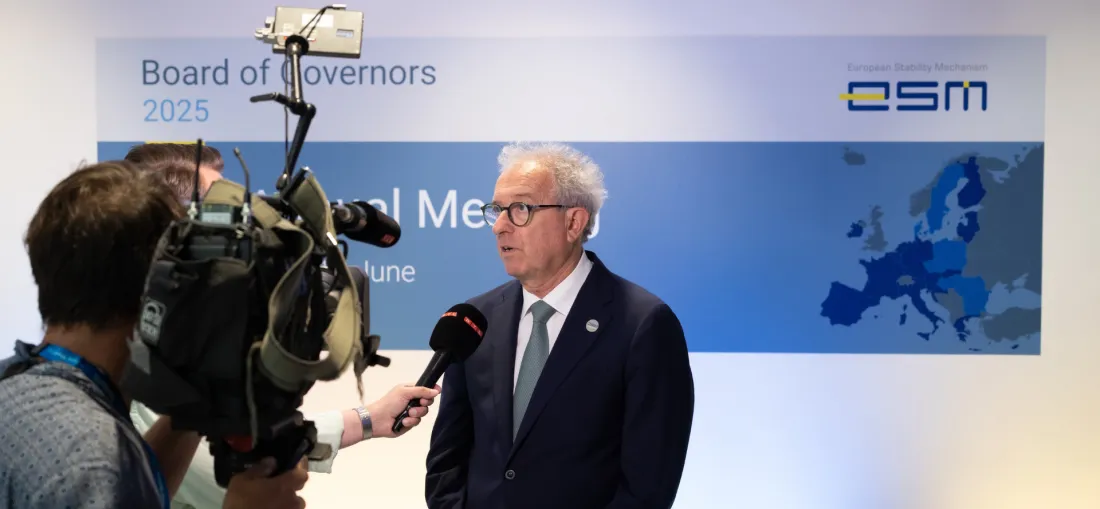Pierre Gramegna in interview with RTL TV (Luxembourg)

Transcript of interview with Pierre Gramegna, ESM Managing Director
RTL TV Luxembourg
Broadcast on 19 June 2025
Interviewer: Ryck Thill
Original language: Luxembourgish
RTL TV: Once a year you meet here in Luxembourg. What’s on the agenda today, and what are the main topics that will dominate the discussion?
Pierre Gramegna: Today is the 13th time we are holding the Annual Meeting of the Board of Governors, where all the countries are represented by their Finance Ministers, who serve as Governors. Today we will approve our Annual Report, including the annual accounts, which are very good this year – the ESM made a profit of €1.8 billion. This is by far the best result we have ever achieved. It is largely because interest rates have normalized and are in positive territory compared to the years before Covid. And despite our very prudent policy for investing our paid-in capital, we have outperformed the benchmarks we set for ourselves. So, a very good financial result.
We will also use this meeting to make sure we are well prepared to act as a rescue fund - that is the role of the European Stability Mechanism - so that we can play our role properly in responding to the various crises we may be confronted with.
We live in uncertain times. You never really know what tomorrow will bring, or next week. Does that mean you're also looking at adapting or expanding your toolkit?
Yes, that’s exactly the goal. We’ve been working on that. Last year, President Pascal Donohoe asked us to review all our financial instruments to assess whether they are still fit for purpose, if they are good. The conclusion is: they are. We have many instruments, similar to those of the International Monetary Fund.
But now, we want to focus more on precautionary instruments. In the past, we have supported five countries financially, always with a plan and conditions. These were for countries already in crisis.
But we also have instruments that haven’t yet been used, and we want to make sure they are effective and ready to be deployed to prevent countries from sliding into crisis. We are reviewing these again to ensure they are efficient and can be quickly activated.
Is there a concern that such a mechanism might have to be activated soon, considering global wars and an unpredictable US foreign and trade policy?
Geopolitics are currently very unsettling, and many new conflicts are emerging. That always carries a potential risk of financial instability, not only in the affected regions, but also globally.
At the moment, I’d say Europe has been and remains very resilient. While we’re seeing only modest growth in the European economy, it’s still growth. Under the current global circumstances, that’s already a positive outcome. And the ESM posted strong results, which also strengthens the resilience of our rescue fund.
We don’t currently fear anything imminent. But when Covid hit, nobody saw it coming, and then you need to be able to act quickly.
Right now, global growth is slowing somewhat due to uncertainties, including in U.S. foreign policy. Not just from ongoing conflicts. That’s why we’re working to be able to act swiftly if needed.
You once said that the ESM could potentially take on a role in European defence. Has that idea become any more concrete?
It’s become very clear that, for many reasons, Europe must spend more on its own defence and its contribution to NATO. The European Commission launched an initiative at the beginning of this year, and in that context, it cited the ESM as a potential "lender of last resort", meaning, when no other options are available.
That’s the natural role of our institution. Of course, this would only apply if financial stability risks arise, and we’re not in that situation now.
Details haven’t been developed, and there’s no need to for now. European countries are aware that a lot of money will need to be mobilised, and we would only come in as a last resort.
And as I’ve said, we have to stay within our mandate: to act when euro area financial stability is at risk, which is not the case now.
You said - the Commission announced €150 billion - that the ESM would only intervene as a last option. But for that, all countries would need to agree. That vote hasn’t happened yet. You also said this isn’t something that has to happen immediately.
Exactly. If the ESM were to play a role, it would have to be within our mandate, meaning financial stability risks would have to be present and a consensus would need to exist that these risks are there. Then a decision would need to be made by all 20 member states unanimously to set up such an instrument. At the moment, we are still purely in theoretical discussions. We haven’t started such talks.
And I’d say that’s actually good news: we don’t need to act right now.
We’re also very valuable when don’t act: the very fact that the ESM exists, with €81 billion in paid-in capital, reassures the markets.
In fact, we are the institution with the highest paid-in capital in the world.
Author

Contacts


